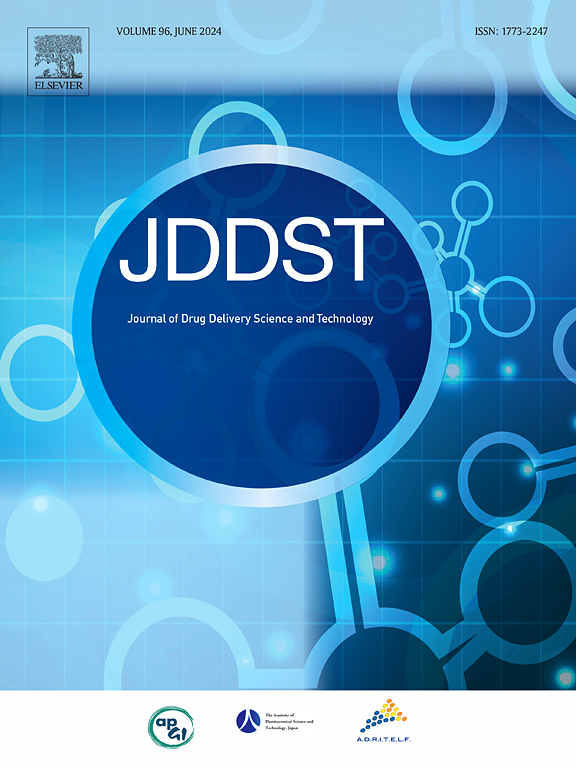Phospholipid and triglyceride-based nanocomposites: A versatile approach for colon cancer – bridging basic science to translational applications in drug delivery and beyond
IF 4.9
3区 医学
Q1 PHARMACOLOGY & PHARMACY
Journal of Drug Delivery Science and Technology
Pub Date : 2025-09-10
DOI:10.1016/j.jddst.2025.107523
引用次数: 0
Abstract
Phospholipid and triglyceride-based nanocomposites are emerging as pivotal strategies in drug delivery systems, particularly for the treatment of colon cancer. Their inherent biocompatibility and capacity for targeted drug delivery enhance therapeutic efficacy while mitigating systemic toxicity. This review critically evaluates the synthesis, characterization, and mechanistic insights into these nanocomposites, emphasizing their structural properties that facilitate drug encapsulation and release. Additionally, the interactions of these nanocomposites with biological systems are analysed, highlighting their potential for targeted therapy in the challenging landscape of colon cancer treatment. Recent advancements in stimuli-responsive nanocomposite technologies are explored, showcasing their ability to achieve site-specific drug release in response to tumor microenvironments. Furthermore, the review discusses preclinical studies assessing the efficacy and safety of these formulations, with an emphasis on their performance in vitro and in vivo. Emerging trends indicate the versatility of phospholipid and triglyceride-based nanocomposites beyond oncological applications, underscoring their potential in other therapeutic areas. Despite significant progress, challenges related to clinical translation, including regulatory hurdles and optimization of pharmacokinetics, remain. This review underscores the necessity for ongoing research to address these challenges and explore the full therapeutic potential of phospholipid and triglyceride-based nanocomposites, paving the way for innovative treatment strategies in colon cancer and beyond.

基于磷脂和甘油三酯的纳米复合材料:结肠癌的通用方法-将基础科学与药物输送及其他领域的转化应用联系起来
基于磷脂和甘油三酯的纳米复合材料正在成为药物输送系统的关键策略,特别是用于结肠癌的治疗。它们固有的生物相容性和靶向药物递送能力增强了治疗效果,同时减轻了全身毒性。这篇综述批判性地评估了这些纳米复合材料的合成、表征和机理,强调了它们促进药物包封和释放的结构特性。此外,还分析了这些纳米复合材料与生物系统的相互作用,强调了它们在具有挑战性的结肠癌治疗领域的靶向治疗潜力。在刺激反应纳米复合材料技术的最新进展进行了探讨,展示了他们的能力,实现特定位点的药物释放,以响应肿瘤微环境。此外,本文还讨论了评估这些制剂的有效性和安全性的临床前研究,重点是它们在体外和体内的表现。新兴趋势表明,磷脂和甘油三酯基纳米复合材料的多功能性超越了肿瘤学应用,强调了它们在其他治疗领域的潜力。尽管取得了重大进展,但与临床翻译相关的挑战,包括监管障碍和药代动力学优化,仍然存在。这篇综述强调了持续研究解决这些挑战和探索磷脂和甘油三酯基纳米复合材料的全部治疗潜力的必要性,为结肠癌和其他癌症的创新治疗策略铺平了道路。
本文章由计算机程序翻译,如有差异,请以英文原文为准。
求助全文
约1分钟内获得全文
求助全文
来源期刊
CiteScore
8.00
自引率
8.00%
发文量
879
审稿时长
94 days
期刊介绍:
The Journal of Drug Delivery Science and Technology is an international journal devoted to drug delivery and pharmaceutical technology. The journal covers all innovative aspects of all pharmaceutical dosage forms and the most advanced research on controlled release, bioavailability and drug absorption, nanomedicines, gene delivery, tissue engineering, etc. Hot topics, related to manufacturing processes and quality control, are also welcomed.

 求助内容:
求助内容: 应助结果提醒方式:
应助结果提醒方式:


